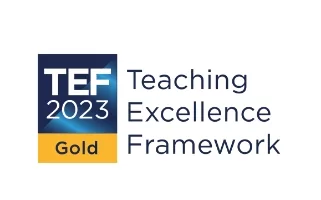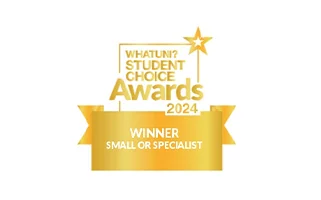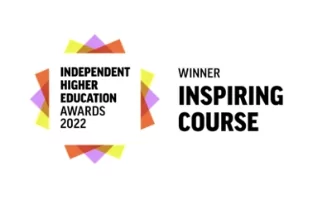We are committed to credible and ethical research in the field of early childhood studies
Learn more about our research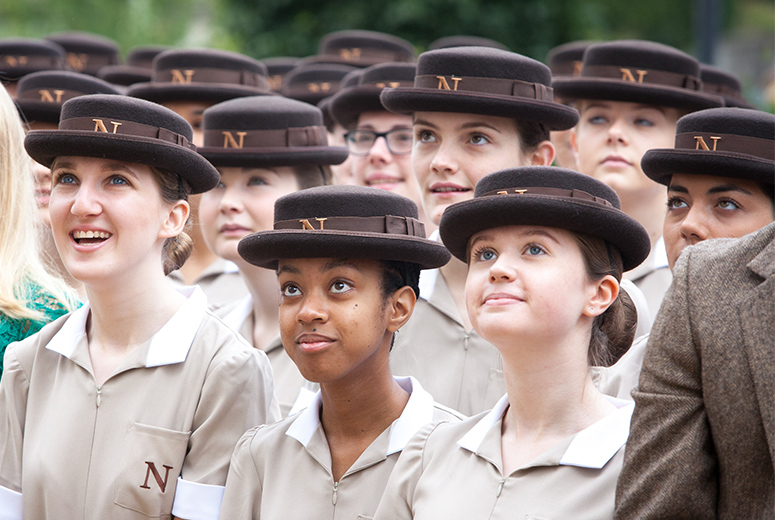
Relational pedagogy in early childhood education. What does the literature tell us?
Research project: Relational pedagogy in early childhood education. What does the literature tell us?
Researcher: Dr Theodora Papatheodorou
Synopsis:
Relationships are crucial throughout life and transcend time, geographical, cultural and discipline boundaries and it is even more so at children’s early stages of life. Indeed, relationship formation is at the heart of early childhood care and education curricula and practices and well-ingrained in the consciousness of early years educators.
While philosophical and cultural notions of existence in the world converse with evidence from neuroscience about child development and the values and practices of early years educators, the field of early years education is at an early stage in conceptualising and empirically exploring the relational and social nature of pedagogy. It was only in the early 2000s that relationships started to be investigated from a pedagogical perspective and the term relational pedagogy emerged in the field of early childhood education.
A literature review has been conducted aiming to compile an annotated bibliography and to map the field of relational pedagogies since the early 2000s. Two research questions were posed:
- What literature is currently available about relational pedagogies in early childhood education?
- What does current literature tell us about the conceptualisation and application of relational pedagogies in early childhood education?
- To locate the relevant literature the following inclusion criteria were established:
- Publications from 2000s onwards only
- Children’s age up to 8 years old
- Early childhood educational provision of different types
- Conceptual papers, empirical research papers, practice-focused papers, books and edited volumes
- Conceptual papers of relevance to education in general.
Papers which focused on older age groups in education were excluded.
The literature review revealed that the field of relational pedagogy is still at its infancy, but encouragingly more publications have appeared during the last five years. Conceptually, relational pedagogy is explored and advocated from an ontological perspective, meaning that human experience is understood in relation to others, underpinned by a dynamic mutuality, affectivity and ethics of care that are realised through dialogical encounters.
From empirical research, relational pedagogy is understood in terms of early years educators’ accepting and caring attitude; establishing personal relationships and connection before exercising professional roles; enabling children’s socialisation and learning; providing reassurance and validation; being knowledgeable; exercising common knowledge and relational agency; knowing children’s interests and working closely with families. Creating joyful experiences that enable dialogue, mutuality, and reciprocity are key features of relational pedagogies.
The existing literature revealed that there are recurrent overlapping as well as divergent themes, illustrating the multi-layered and multi-faceted complexity of relation formation, revealing the challenges in articulating a relational pedagogy epistemology at a conceptual and applied practice level. However, articulating a relational pedagogy epistemology is crucial for understanding the nature of relationships developed in a professional capacity as opposed to relationships established in a personal capacity in familial and friendship context.
Relationality in a professional capacity may overlap with personal relationships, but it is different too. Relationality in a professional capacity is subject to certain personal and institutional conditions and circumstances and requires a range of competencies which could be developed and enhanced though training. Such competencies, however, can often be indeterminable, requiring a high level of awareness and alertness on the part of the early years educators.
Acknowledgements: With thanks to Bogdan Dragomir and Monica Fearn, Graduate Research Interns at Norland, who assisted with literature searches papers.
Funding: The Graduate Research Internship was funded by Norland Foundation.
Publications
- Papatheodorou, T. (2023) “Relational Pedagogies in Early Childhood Education” In Oxford Bibliographies in Education. Ed. Susan Faircloth. New York: Oxford University Press. Available at: https://www.oxfordbibliographies.com/display/document/obo-9780199756810/obo-9780199756810-0301.xml?rskey=QO74Qg&result=1&q=Papatheodorou#firstMatch
Conference papers
- Papatheodorou, T. (2022) Relational pedagogies in early childhood education. Conceptualisation, implications for practice, and the challenges for evaluation, Webinar at Aristoteleio University, Thessaloniki Greece, 7 May 2022 (Title in Greek: Σχεσιοδυναμική παιδαγωγική στην προσχολική αγωγή και εκπαίδευση: Θεωρητική προσέγγιση, πρακτικές εφαρμογές και η πρόκληση αξιολόγησης)
- Papatheodorou, T. (2023) Beyond Human Relationality – Exploring relationality with nature in early childhood education. Paper presented at the RCEN 2023 conference. London (15-17 June)
What are the perceived benefits of students participating in a voluntary sewing group?
Research project: What are the perceived benefits of students participating in a voluntary sewing group?
Researcher: Kate Jaeger
Synopsis: The benefits of engaging in arts and crafts, including sewing, have been well documented in the literature. Learning a new skill, meeting new people, engaging in a relaxing activity are all things that are cited in the literature and I have personally experienced and observed others enjoying, as a sewing lecturer.
There is research exploring the benefits of arts and crafts with various minority groups, but not specifically with sewing and students. This triggered my research project. At the beginning of 2020, I approached first year students at Norland College to offer them the opportunity to attend a 6-week, voluntary sewing group.
My aim was to trial a sewing programme to refine and finalise for its implementation with other groups in the wider community and research the perceived benefits of students attending the group. The sewing programme was delivered over a period of six weeks. Fourteen students participated in the programme. Ethical approval was received before conducting the research project.
I used case study action research methodology to address the aims of the study Methods of collecting data included a weekly diary, completed by students and a reflective diary kept myself. Qualitative data were analysed using thematic analysis and descriptive statistics were used for quantitative data.
The project enters its second phase (further details to follow soon).
Quality(ies) of home-based childcare
Research project: Quality(ies) of home-based childcare
This research project is a collaboration between Norland College and the Early Childhood Research Group, Anglia Ruskin University
Lead researchers: Dr Theodora Papatheodorou, Norland and Dr Paulette Luff, Angila Ruskin University
Research team: Mandy Edmond, Selvie Hayward, Jessica Bradley (Norland) and Dr Kay Aaronricks (Anglia Ruskin University)
Project duration: 2020 – ongoing
Note: The Qualities of Home-Based Childcare project was initially conceptualised by the lead researchers in Spring 2020. Due to COVId-19, the project was postponed and commenced in summer 2021 with a revised methodology to ensure adherence to COVID-19 guidelines.
Synopsis:
Home-based education and care is an under-researched area, compared with centre-based provision, and less is known about its qualities. This project was conducted to explore the qualities of home-based childcare, based on the reported experiences of registered childminders and trained nannies, posing the following research questions are posed:
- What are the key qualities and characteristics of home-based childcare, offered by childminders and nannies?
- What are the perceived benefits, as perceived by childminders and nannies?
- What are the professional training and continuous professional development opportunities for childminders and nannies?
- What would make possible an expansion of home-based childcare, as part of national policies and financing arrangements?
The study was carried out in two phases. An initial scoping study was conducted to build a comprehensive picture of what is known and what is not known about home-based child care. In the second phase primary data was collected, by means of an online survey and focus group discussions, used in a sequential manner.
Outputs
- Papatheodorou, T. Luff, P. Aaronricks, K. Edmond, M. Hayward, S. and Jessica Bradley (2022). Qualities of home-based Childcare, Research project report. Bath: Norland (unpublished)
Publications
- Papatheodorou, T. and Luff, P. (2023) ‘Characteristics and qualities of home-based childcare: exploring the views of trained childminders and nannies’, Norland Educare Research Journal, 1(1), article number 8. Available at: https://doi.org/10.60512/repository.norland.ac.uk.00000008
- Papatheodorou, T., Rose, J. and Luff, P. (2023) ‘Editorial – Home-based educarers: powerful agents who cannot be neglected!’, Norland Educare Research Journal, 1(1), article number 1. Available at: https://doi.org/10.60512/repository.norland.ac.uk.00000021
Conference papers
- Papatheodorou, T. (2023) Home-based educarers – Knowledge brokers and social capital bridgers. Paper presented at the 6th World Teaching and Education Conference, Zurich (7-9 July)
- Aaronricks, K., and Luff, P., Pedliham, R. and Papatheodorou, T. (2021) Childminders and nannies beyond the walls: What is distinctive about home-based childcare? Paper presentation at Norland Annual Conference (28 June 2021)
- Luff, P. and Papatheodorou, T. (2022) Exploring the centrality of relationships in home-based childcare. Paper presentation at Norland Annual conference, (28 June)
- Papatheodorou, T., Luff, P. (2022) Home-Based Child Care: What’s in it? What are the Challenges? Could it be an alternative model of childcare? Paper presentation at the 74 OMEP international conference, Athens Greece (12-15 July)
- Papatheodorou, T. and Luff (2022) Relational Foundations of home-based childcare, Paper presentation at the Virtual RCEN conference, organised by the University of Sacramento-USA (11-13 June)
Acknowledgements
With thanks to Holly Forster and Marianna Misca, Research Interns at ARU, who supported the initial phase of the scoping study
Funding:
- The project was funded by Norland Foundation
- The ARU Research Interns were funded by ARU
- The Norland Graduate Research Intern was funded by Norland Foundation
For more information, please contact:
Dr Theodora Papatheodorou: [email protected]
Dr Paulette Luff: [email protected]
The demographic of Norland students
Research project: The demographic of Norland students
Researcher: Dee Burn
Supported by: Kexin Cheng (Graduate Research Intern)
Synopsis: This 12-month project aims to develop a rich understanding of Norland students as they embark on the first steps of their Norland journey from first point of contact through to enrolment. It will look at Norland student demographics compared to the national picture of undergraduate students in the early years and related subject areas. The project will also focus in on student motivations, aspirations and their key questions and concerns prior to beginning their studies at Norland. Widening participation will also be considered in line with Norland’s commitment to finding and supporting those who will make the very best early years practitioners regardless of age, gender, disability, ethnic or socio-economic background. The project aims to produce a set of detailed student personas that will inform and guide Norland’s recruitment, teaching and learning, student support and lifelong career support activities.
An examination of viva as an assessment tool for work-based assessment in early childhood undergraduate studies
Research project: An examination of viva as an assessment tool for work-based assessment in early childhood undergraduate studies
Researcher: Tom Parsons
Supported by: Juliane Buchheit (Graduate Research Intern)
Autism in very young children, up to four-years-old - Development of a support programme
Research project: Autism in very young children, up to four-years-old – Development of a support programme
Researchers: Dr Theodora Papatheodorou
Research assistant: Amy Prescott
Project duration: 2021-22
Synopsis
Autism, also referred to as Autistic Spectrum Disorder (ASD), is a lifelong neurodevelopmental condition which cannot be treated or cured. However, if the condition is diagnosed early on, autistic children can be supported to enhance their potential, strengths, and capacities to lead a fully functioning life. Yet, there is limited knowledge and understanding of autism especially among very young children (0-4yrs) indicating a clear gap in scientific research.
This research project was conducted in three phases. In the first phase a systematic literature review was conducted to establish existing scientific evidence about autism in very young children. Consequently, existing scientific findings were reviewed and conceptualised to develop a framework that informed the development of a support programme. In the second phase, the First Steps – An Early Autism Family Support Programme was designed with the input of experiences therapists, autism experts, and parents of children with autism. In the third phase, the support programme was piloted in order to review its implementation and revise the programme document, systems and processes, accordingly.
The research project was initiated by Norland in collaboration with the Transforming Autism project. Norland has licensed the First Steps – An Early Autism Family Support Programme to TAP for its implementation.
Outputs
- Papatheodorou, T. and Prescott, A. (2022) First Steps: An Early Autism Family Support programme. Bath: Norland. Available at: https://www.norland.ac.uk/wp-content/uploads/2022/09/FIRST-STEPS-PROGRAMME.pdf [ The programme is licensed to Transforming Autism Project for implementation)
- Papatheodorou, T. and Prescott, A. (2021) The early signs of autism and interventions for children up to the age of four years old: A systematic review of the literature. Bath: Norland (Unpublished report)
Publications
- Papatheodorou, T. and Prescott, A. (forthcoming) Home-Based Support for Young Autistic Children: Overview of a Programme Co-designed with Researchers, Child Therapists and Caregivers. In U. Das and N. Papaneophytou (eds) Autism: A Metamorphic Orientation Toward Systems, People, and Things. London: Elsevier (in press)
Conference papers
- Papatheodorou, T. (2023) Supporting young children with autism – A strengths-based, playful and relationship-focused approach. Invited paper at the OMEP Peru conference. Lima Peru 913-14 October)
- Papatheodorou, T. and Prescott, A. (2023) Intervening Early: Development of a Metamorphic Support Framework for Young Autistic Children. Paper presented at the International Oxford Round Table Symposium. Oxford (12-16 March).
- Papatheodorou, T. and Prescott, A. (2022) In-home support for very young autistic children and their caregivers; The crucial role of sensory and affective reciprocity in child and caregiver interactions. Paper presented at Norland Research Conference (28 June)
- Papatheodorou, T. and Prescott, A. (2021) Intervening early – Developing a therapeutic intervention framework for young autistic children. Paper presented at Norland Research Conference (29 June)
Acknowledgements
With thanks to the following therapists and experts for their input during the design of the Autism Support framework and the bespoke programme for the Transforming Autism Project charity
- Zuzana Camm, Child Psychotherapist and Advanced DIRFloortime Practitioner and Coach (Child therapist, Transforming Autism Project)
- Shaun and Sharon Halloran, parents of an autistic child
- Aaliya Mavani, Occupational Therapist (Transforming Autism Project)
- Sarah McDonald, Project manager (Transforming Autism)
- Dhakshini Patel, Integrated Child Psychotherapist (Lead child therapist, Transforming Autism Project)
- Giora Shayngesicht, Developmental Therapist and Supervisor at the Mifne Center in Israel (external member)
- Dr Susanna Towers, autism expert and parent of an autistic child (external member)
- Jane Yates, Integrative Child and Adolescent Psychotherapeutic Counsellor (Child therapist, Transforming Autism Project)
Funding
The project was funded by Norland Foundation
Learn more about the programmeThe Festival of Quilts 18-21 August 2022
National Exhibition Center, Birmingham, UK
Title of Piece: Love Never Faileth – Norland 125th Anniversary Quilt
Project by: Kate Jaeger
Name of principal makers: Kate Jaeger; Kristina Coles; Nicola Giddings; Katie McCluskey; staff and students at Norland ; Children at St Stephen’s School, Bath; Mary-Jane Hutchinson Trym quilting, long arm quilting. Special thanks to Marion Bedford for her help and advice
Artist’s statement/inspiration:
As the Sewing Lecturer at Norland, I was inspired to make this Love Never Faileth quilt to commemorate Norland’s 125th anniversary. During my research I had come across Blackwork, Redwork and Bluework quilts and loved the simplicity of using an embroidered outline and one colour to create a picture. Redwork is a form of embroidery developed in the 19th century. Redwork designs were outlined pictures created using simple linear stitches exclusively worked in red thread on white fabric. Traditionally red threads were chosen because red dyes were the first commercially available colourfast dyes. Later Bluework and Blackwork quilts became popular too.
As children are at the heart of everything we do at Norland, we felt it was important that children were involved in the creation of the quilt somehow. As my research ideas came together, creating a quilt using children’s’ drawings and the Bluework formula seemed the obvious way to include children. Blue is a historical colour of Norland, taken from the speedwell flower that has featured on the badge awarded to fully qualified Norlanders since the 1900s.
I visited a local primary school in Bath, which hosts Norland students on placement, and asked the children to create line drawings of Norland Nannies and the activities they like to do with them. The children enthusiastically drew all kinds of wonderful pictures and playful scenes depicting joyful moments.
Norland staff and students transferred the children’s drawings onto squares of unbleached cotton, which were then embroidered in a speedwell blue colour thread using simple embroidery stitches. The fabric used for the sashing was created during a printing project as a mop-up cloth which created the fantastic painterly effect. Speedwell flowers were appliqued and used as the four anchor stones and Norland’s two founding mottoes, ‘Love Never Faileth’ and ‘Strength in Adversity’, are included using print.
This commemorative quilt is a celebration of children and everything they love to do, depicted through their drawings and lovingly stitching by Norland staff and students. It is a fantastic multi-generational collaboration that not only represents a milestone in Norland’s long, pioneering history but also that love and stitch will always bring us together.
Materials used: White Modena cotton; Cotton quilting fabrics; Wadding; Stranded embroidery threads
Techniques used: Applique; Embroidery; Print; Domestic sewing machine; Long arm quilting
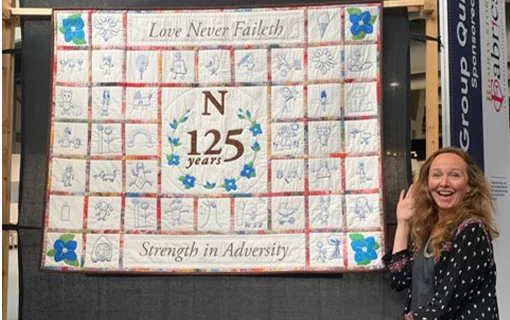
Research project: The Ergon and Legacy of Emily Ward
Researchers: Dr Theodora Papatheodorou
Project duration: 2021 – ongoing
Synopsis
Emily Ward (1850-1930) founded the Norland Institute in 1892, the first educational establishment to offer any kind of childcare training. Inspired by Froebelian philosophy, Emily Ward advocated for child-centred, loving, and nurturing childcare – a dominant discourse and practice in the field of early childhood – offered by trained staff rather than from ‘untutored’ housemaids. Her mottoes were ‘Love Never Faileth’ and ‘Fortis In Arduis’ (Strength in Adversity).
Despite her long lasting legacy, little is known about Emily Ward’s work and she remains unacknowledged in midstream literature about early educational pioneers, raising the question of why is this? This question set off an initial exploration of Emily Ward’s editorial letters in the Norland Quarterly, a paper which Emily Ward edited and contributed to since the foundation of the Norland Institute and up to a year before her death in 1930. This was followed by further examination of her personal diary. The socio-historical, political, and economic context, as well as educational trends, of late 19th to early 20th century were also considered.
A post-qualitative methodology, framed against social semiotics and archival theories, was adopted to explore Emily Ward’s poreia (from the Greek word πορεία, meaning walking a long distance through different stages) and ergon (from the Greek word έργον meaning a product of physical and/or intellectual significance). The exploration the Emily Ward’s editorial letters and personal diary started from the aporia (from the Greek word απορία, a state of being confused, perplexed, bewildered, unable to understand) of why so little is known about Emily Ward, without having a pre-determined research questions.
Through this process, it is intended to provide a chronography of Emily Ward’s poreia and dissect her ergon to better understand her contribution to early childhood educare at her time and increase the scholarship about her work and legacy.
Conference Papers
- Papatheodorou, T. (2021) ‘Love Never Faileth’ and ‘Fortis In Arduis’ – The legacy of Emily Ward, an unsung early years pioneer. Invited presentation at the OMEP UK Webinars (10 November)
Acknowledgements
With thanks to:
- Ainur Meirbekova, Graduate Research Intern, for her input about the socio-historical, political, and economic context, as well as educational trends, of late 19th to early 20th century
- Ellen Donovan, Graduate Research Intern, for her input on archival theories
Research project: An exploration of educational gain earned at Norland
Researchers: Mandy Edmond, Clare Hutton and Callum Marshall, supported by Alidia Newlan (Graduate Research Intern)
Project duration: 2023
The Office for Students (OfS) is placing particular emphasis on student outcomes as a measure of success in Higher Education institutions. Educational gain is a key metric of this, and this project aims to explore educational gain achieved by students at Norland by examining data on recent Norland students’ entry qualifications and their corresponding exit awards for the first time. As well as constructing an overall view of educational gain achieved at Norland, educational gain within particular student characteristics will also be explored, in line with the split indicator measures utilised by the OfS when presenting student outcomes data. Through this research, we hope to be able to gain useful insight into the distance travelled by Norland students, and to underpin widening participation endeavours at Norland.
